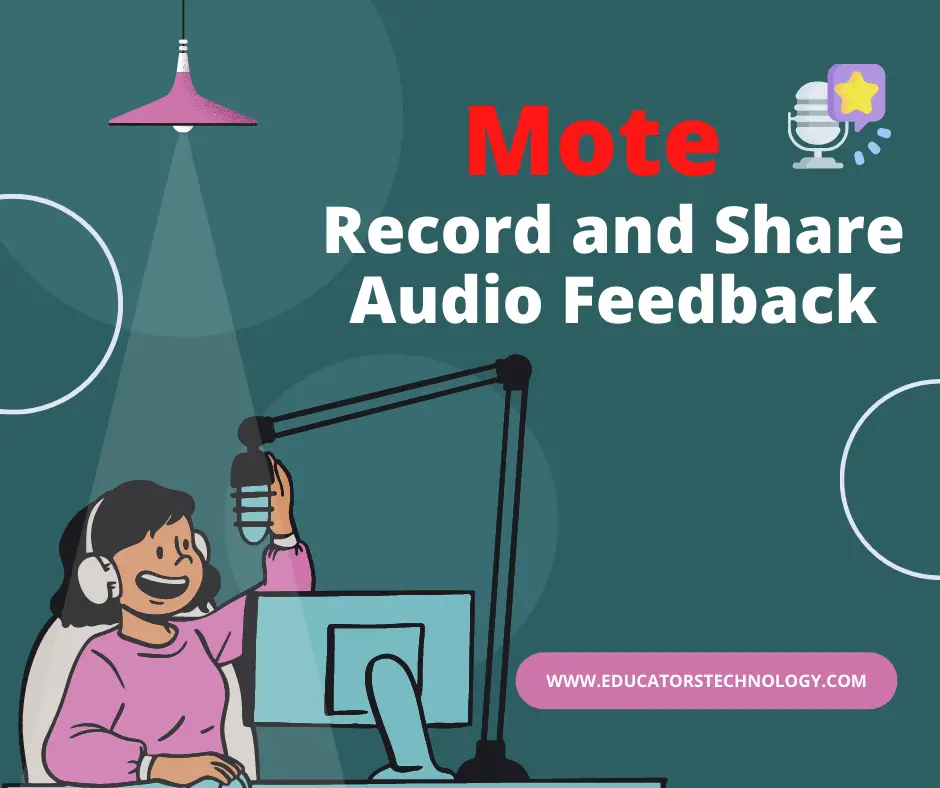Mote is an audio recording tool that allows you to create and share audio notes via Gmail, Google Docs, Slides, Google Forms, and Google Classroom. You can also create audio notes for any website or application by using Mote Chrome extension. Mote audio notes can be transcribed into more than 20 languages including Spanish, English, Arabic, Portuguese, French, among others.
Often times, audio feedback can be a better option than textual feedback. Recording feedback and sharing voice notes using your own voice ‘conveys far more energy, emotion and empathy than text’.
Audio feedback captures semiotic elements that are not easily rendered in writing such as pitch and intonation which help a lot in communicating our emotions and building stronger connections.
Using Mote in education
There are different ways teachers can use Mote’s audio feedback in their instruction. For instance, teachers can use voice notes to supplement textual comments shared on Docs, Classroom or Slides. Audio notes can carry more explanatory load thus enhancing students comprehension.
Language teachers can use Mote to enhance student learning of new languages. Teacher can record audio notes to ‘provide guidance on pronunciation in either native language, learned language or a mixture of both.’
Students can also record their own audio feedback to model the pronunciation of the target tongue and to practice speaking new vocabulary items. This will tremendously boost their speaking fluency and oral communication.
For music teachers, voice notes are probably the best option to share audio feedback. Teachers can use Mote to ‘play examples and sing back rhythms to students’ as a part of their feedback. As a Mote user, you can easily track engagement with your audio notes and see who has listened to your voice notes and respond accordingly.
Voice to text
One of the great features I like about Mote is its voice to text functionality. Teachers can use it to transcribe their audio notes and translate their transcripts into various languages. Transcripts can help with enhancing students language learning, connecting with language learners, and in facilitating intercultural communication.
You can record your audio note and edit its transcript the way you want. You can then save your Mote transcripts to your Motebook for later use. Mote’s STEM mode enables you to transcribe mathematical expressions and chemistry compounds, which is especially ideal in STEM classes.
Mote for Gmail
Mote allows you to create and send voice notes via Gmail. Recipients of emailed notes will be able to listen to your voice notes and access the accompanied transcription. Here is how to add a Mote voice note to your Gmail emails.
First open a new message in Gmail, click on Mote icon next to Send button and start recording your voice. Click on the Mote icon once again to stop recording. The clickable Mote card is now inside your message, click Send to share it with others.
If the recipient has the Mote extension installed they will be able to listen to your voice notes directly in Gmail. Users who do not have Mote installed will be directed to a specific landing page where they can listen to the voice note. Watch this video to learn more about Mote.
Mote app
Mote is available as a mobile app for iPhone and iPad. Once Mote app is installed, you will be able to easily record audio message right from your mobile device. You can also share your recordings via a weblink within any of your apps (e.g., Google dOCS, Slides, Forms, Google Classroom, etc).
How much does Mote cost?
Mote offers three plans: a Free plan with limited features (e.g., record a mote on any webpage, app integrations, 30 second recording time, 20 motes per month); an Unlimited plan ($39.00 per user/year) and offers everything in the free plan plus 180 seconds recording time, voice to text transcription, and the ability to save and re-use motes; and finally Schools plan for entire schools and districts (custom pricing).





